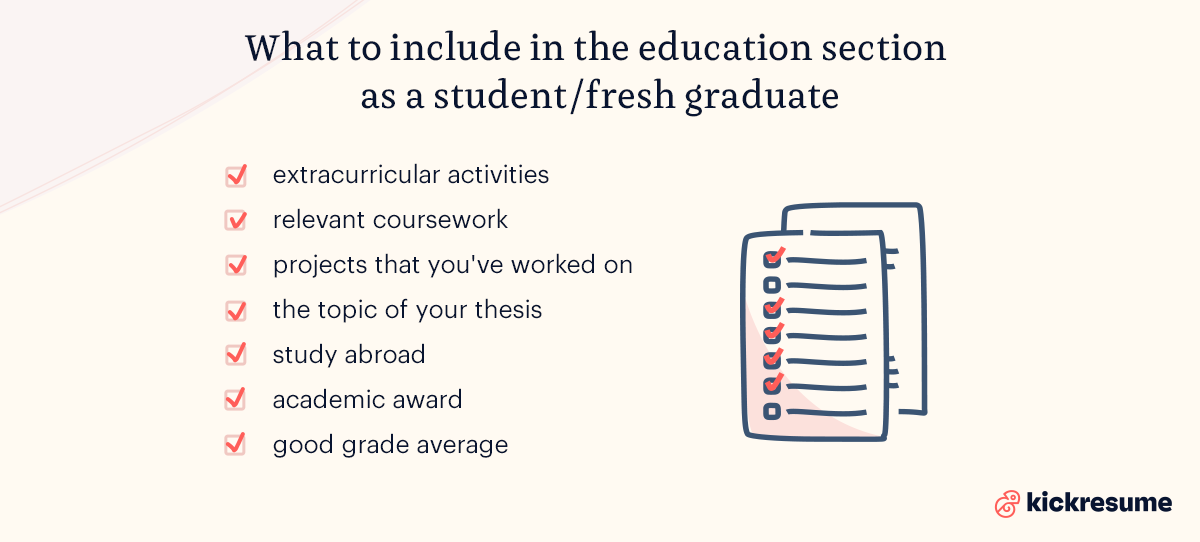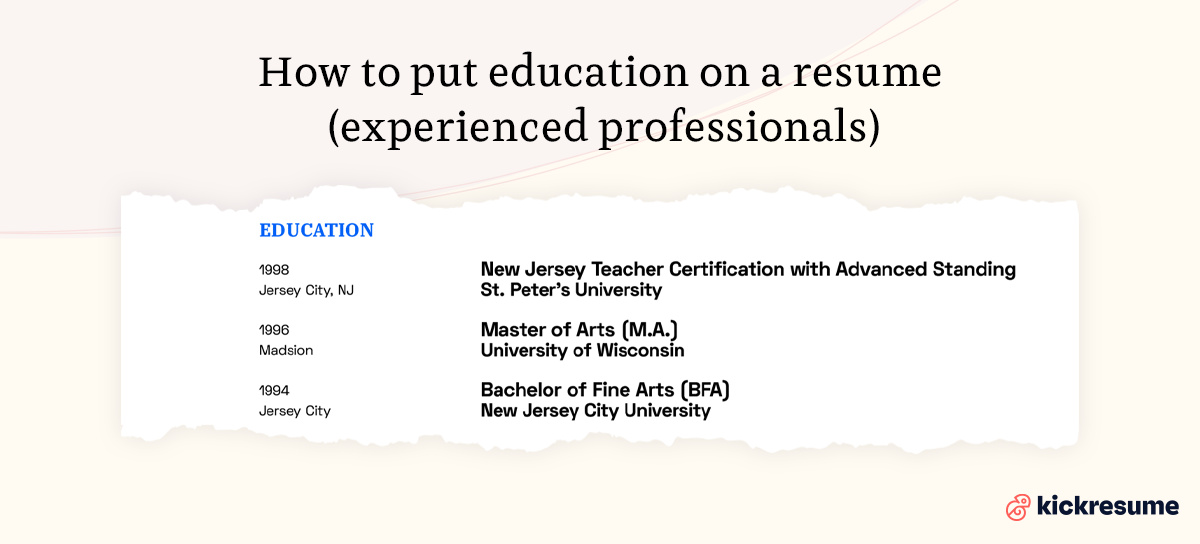The education section on your resume can be the most important part of your resume, but in some cases, it can also be almost irrelevant. It all depends on your degree and where you're in your career. That’s why it’s important to know where and how to put your education on a resume.
To put it simply, the education section is the section on your resume where you list your degrees and relevant academic accomplishments. It’s one of the key resume sections that you can find on almost every resume ever written.
So keep reading to know what mistakes to avoid and what to include in order to impress a potential employer.
This guide will also explain:
- Why include an education section on your resume?
- What information to include in your education section?
- Where should you place it on your resume?
- How to write your education section?
- ...as a high school graduate?
- ...as a student/ fresh graduate?
- ...as an experienced professional?
- ...when you're changing careers?
Too long, don't want to read? Here's a video guide.
Why include an education section on your resume?
There’s a good chance that every resume you’ve ever seen had an education section. But why is it so? If in some cases education isn't relevant at all, why does everyone include it in their resumes? 🤔
- Employers expect to see it. While this reasoning may sound silly, conventions are conventions. If you want to get hired, it’s crucial to meet your future employer’s expectations. And not including an education section on your resume can raise many suspicions about your background, or willingness to follow rules.
- Your job requires a specific degree. For example, you can't become a medical doctor without a medical degree. We all know that. The same goes for being a lawyer and many other professions, or people who aim at better-paid positions in corporates.
- Your educational background can help you stand out. This is especially true if you’re a fresh graduate or a student. Sure, adding a prestigious degree to your name can increase your chances, but that’s not all. Try to inflate your education section by mentioning your GPA, scholarships, awards, being on student committees, etc. Anything to help your future boss see your full potential.
What information to include in your education section?
For each entry about your education, there's a set of information that recruiters expect to see.
Information that's a must:
- The name of educational institution/s
- Location of the schools/s
- Starting and graduation year (if applicable)
- Level of study
- Field of your studies
- Obtained degree
Optional information:
- Your grade (you want to include this if your grade was good — if not, it's better to ignore it)
- Any extra academic awards or recognition
- Extra educational courses, classes, or training
- Study exchange programs (such as Erasmus or a year abroad)
- Final thesis
- Scholarships
- Other academic achievements
How to write your resume education section?
So how do you put that information in your education section? Follow these basic steps:
- Write about your education in a reversed chronological order. Place your most recent education first and then continue with the previous ones (if applicable).
- Always include the name of your school and its location. In most cases, list the name of your school first. This is the best thing to do especially if your degree has nothing to do with your desired role. The recruiter's attention will be drawn to the name of the institution instead of the study subject.
- Specify your degree and field of study. You can either spell out the full title, e.g. “Master of Arts”, or use the initials “MA”. If you have more than one degree from the same school, list your most recent degree first. Also, list your minors or concentrations after your major.
- Don’t forget the dates. Include the year you began your studies and the year you graduated. Remember, you don’t have to include any specific dates if you seek to avoid discrimination based on your age.
- Add other optional information. This applies to you if you’re a student or fresh out of school. Consider adding information such as good grades, awards, Dean's list, being a part of a committee, related school projects, etc.
What does this look like in practice? Take a look at the sample below!

Or to write your own education section, use the following template. Of course, include only the information that pertains to the job you want:
Education Section Template
Name of Your School, Location — Dates of duration or year of graduation
Degree, the field of study
(+ additional info that students and graduates can include):
- Relevant coursework or student activities
- Study abroad
- Extracurricular activities
- Grade point average (if it’s above 3)
- Academic honors
- Scholarships
- The topic of your final thesis together with the outcome (if it’s related to the job)
- Other academic achievements

Where to place your education section?
So now that you know what to include in your education section, you must know WHERE to place it within your resume.
Generally speaking, you should position it either before or after your work experience section. So, which placement is better for YOUR resume?
Well, as with the rest of your resume, the rule of thumb is: always put the most important information first. Ask yourself — what's my best asset? What makes me stand out from the crowd of applicants? Is it years of experience in the field? Or the fact that I've just finished a really good school?
In other words, the location of the education on your resume is determined by the stage of your career (and the resume format you choose).
Are you a student or a fresh graduate?
If this is your case, then remember: your education is still probably your main strength. So go with the functional resume format and play into it!
Place the education near the top of your resume; just below your resume objective/profile section. This way, your education will be the first thing that recruiters will see.
But what if you worked during your studies?
Even if the work experience wasn't in the field of your studies, you must have learned valuable skills. So make sure you include them in your resume. Place them right underneath your education.
And if you've managed to land a cool internship related to your studies, even better! In this case, you may even consider placing it ABOVE the education section. However, make sure you do this only if the internship experience outshines your education.
Are you an experienced professional?
In this case, go with a chronological resume format and place your education section anywhere on the page, as long as you place the work experience section first.
Just remember: you should always put the most important information first. At this point in your career, your education isn’t nearly as important as it used to be. Because of that, it should probably find its place near the bottom of your resume.
How to list your high school education on a resume?
So far, we mostly talked about how to list your college education. That’s because once you’ve already got your university degree, you can leave your high school degree out of your resume.
But what if you've never attended university?
Well, it means that your resume’s education section is going to be pretty straightforward and it will focus on your high-school experience.
All you have to do is list the name of your high school, its location, and the dates. There’s no reason to complicate it any further.
The exception is if you graduated less than three years ago. In this case, when you don’t have years of professional experience to lean on, add anything to your education section that shows off your skills and talents, such as:
- awards and unique achievements
- competitions that you've attended
- extracurricular activities
- honors
- clubs and organizations you were a part of
- good academic results
Feel free to include details about any projects or clubs you joined while at school. Focus on including specific examples to demonstrate your motivation and initiative.
Did you write for high school newspapers and published 16 articles? Then it deserves a mention in your education section!
The bottom line is simple: Look for anything that helps you show your enthusiasm and work ethic.
Think of clubs, organizations, extracurricular activities, or even volunteer work (even though volunteering may deserve its own separate section). All of these can count as major achievements if you don’t have work experience yet.
Pro tip: Make the education section relevant. Only include information that's related to the specific job opening that you’re interested in. Keep an open mind and remember that transferable skills can make a huge difference, too. In other words, tailor your resume.

How to write an education section if you're a fresh graduate or student
If you’re a student or you’ve just graduated, you probably don’t have much work experience to put on a resume yet. That’s normal. On the other hand, what you do have is academic experience.
That means the education section should dominate your resume. Make it more elaborate in comparison to other sections and place it at the top of your resume.
During your studies, you must have learned and achieved more things than you probably realize. So — don’t make your education section only about the degrees obtained. Use this space to present all of your most notable academic accomplishments.
Consider including the following:
- Academic awards: e.g. AP scholar, Duke of Edinburgh award, National Merit Award, President’s Award, school subject-based awards, etc.
- Scholarships: e.g. athletic scholarships, scholarships for women, creative scholarships, etc.
- Academic conferences and symposia: Don’t forget to mention the scope and name of the paper you presented at a conference.
- Relevant student societies: e.g. debating societies or programming clubs. If you were on the committee of any kind of student society, make sure you include it as well.
- Dean’s list.
- GPA: Only include if it was higher than 3.0 on a 4.0 scale. If your overall GPA was lower than that, mention your major GPA. Alternatively, mention your summa cum laude or magna cum laude. But if it wasn’t great, you can simply leave it out. And if you're out of school for a couple of years, you should take your GPA out of your resume no matter what.
- Academic publications: This may not apply to you but if you have a Ph.D. (or working towards it), you’re expected to include at least one publication.
- Extracurricular activities: Show that you're active and care! Doesn't matter if it's football, book club, or volunteering. All of these activities show that you are able to work with people and are interested in the world around you.
- Relevant coursework: Demonstrate that you know plenty about the work that youre applying for. Academic knowledge matters, especially if you dont have hands-on experience yet.
- Projects that you've worked on: Are they related to the job you're applying for? Make sure you include it!
- Final thesis: This matters especially if you've earned a good grade, it got published, or you've researched something related to your potential new position.
- Study abroad: It demonstrates flexibility and the fact that you can adapt easily to new environments.
However, if you've acquired solid work experience already, you can also place your education section after it. Keep in mind — what’s more important comes first.
This can be, for example, a standout internship.
Internships
Having an internship on your student resume will automatically make you stand out from the crowd of student applicants. But you already know that.
Whether the internship is paid or unpaid, doesn’t matter. The most important thing is that you can show you’re motivated and willing to work.
Once you’ve got an internship under your belt, make sure to place it in a separate resume section, as it deserves this special treatment.
Now you may ask, where to place this internship section. Before, or after your education?
Well, the most impressive information on your resume should be placed first. So, judge the importance of your internship:
- If it was a longer internship in a prestigious company, feel free to put the internship section before the education section.
- On the other hand, if you’re a student at an Ivy League school with an excellent grade average, a month-long internship experience in a local company should come second after your academic achievements.
How to write an education section if you’ve never graduated (dropped out)?
Many people feel ashamed if they haven't finished their studies. Consequently, they make the mistake of not mentioning their studies at all. And as a result, they leave out years of valuable academic experience.
Don't make this mistake. Dropping off of a university or taking a leave of absence is now a part of your story. And if you can sell it well, it doesn't even have to harm your chances of getting the job.
So, always include unfinished education on your resume. It's better than leaving that period of time unaddressed. That's because gaps in your resume always make hiring managers a bit suspicious.
And if you’re just taking a break in studies (so you don’t have a degree yet), also just put it on your resume. In this scenario, all you have to do is emphasize that you’re still working towards finishing your studies.

How to write an education section if you’re an experienced professional?
Once you become an experienced professional, your education section takes a back seat to your professional experience. Your interviews will revolve around your work experience and professional achievements rather than your academic career.
This means that you can get away with simply listing your degrees in reverse-chronological order with basic info like university name, location, degree, and field of study — and leave it at that.
Feel free to remove more specific details about your education such as GPA, or extracurricular activities related to coursework, or even attendance dates.
How to write an education section if you’re changing careers?
Even if you’re completely changing careers and are moving away from your field of expertise, your education remains important. However, it’s also not as big of a selling point as the skills you possess. Because of that, you should position your skills and relevant experience above your education section.
The easiest way of doing this is to write a functional resume, as opposed to the more traditional chronological resume. This resume format allows you to place transferable skills first, and work experience and education second.
You may be asking — what if my education isn’t related to the job I’m applying for at all? Should I still include it? And the answer is yes!
Just make sure that you write the name of the institution first. By doing so, you can first draw attention to the fact that you attended a (prestigious) university. It's only then that recruiters notice your somewhat unrelated degree.
But you can impress the hiring manager with your education section anyway. Besides listing key information such as the name of the institution, degree, and dates, you should also consider including accomplishments that are related to the position that you're applying for.
Think of any coursework, or student clubs and organizations involvement, where you gained transferable skills. You can also mention academic awards, even those that aren’t related to your new job, as they can help you impress the hiring manager.

Final tips on how to make your education section stand out
- Consider adding subsections. If you have a lot of information to include in the education section, consider dividing it into subsections. You can divide it into Basic information (schools and degrees), Awards and Honours, Certifications, School Organizations, or Volunteer Work.
- Keep ATS in mind. ATS normally uses school rankings to assess candidates. If you’re still at school and have your university email address, use it to associate yourself with the school’s reputation. Make sure to include the full name of the school together with its abbreviation, e.g. Massachusetts Institute of Technology (MIT).
- Get certificates. If your academic background isn't something you can be really proud of, get an online certificate from one of the top universities like Harvard or Yale. Then you’ll be able to use the school’s name to your advantage.
- Tell the truth. It’s very easy for hiring managers to confirm whether your education is true or not. Also, be honest about your grades. If you’re not happy with your GPA, instead of making it up, rather leave it completely out of your resume.
- Tailor it to the position: Just like with the rest of your resume, tailor your education section to the job description. If certain courses or projects you completed align with the job requirements, make sure to highlight them. This shows the employer that you already possess relevant knowledge and skills for the job.
Oh, and if you have a LinkedIn profile filled with all the important details, including your academic background, skills, experience, and qualifications, you can easily turn it into a polished resume with just one click.

![How to Write a Professional Resume Summary? [+Examples]](https://d2xe0iugdha6pz.cloudfront.net/article-small-images/i-Profile.svg)
![How to Put Your Education on a Resume? [+Examples]](https://d2xe0iugdha6pz.cloudfront.net/article-small-images/i-Collage-Universities.svg)
![How to Describe Your Work Experience on a Resume? [+Examples]](https://d2xe0iugdha6pz.cloudfront.net/article-small-images/Experience.svg)


